Dairy-free milk alternatives are becoming an obvious choice for more consumers, while purposeful dining concepts are slowly changing the face of Singapore’s restaurant landscape. To find out more about the country’s dining scene that’s increasingly becoming aware of environmental consequences, we spoke to key individuals who are playing an important role in its evolution.
Oatside

Oatside is a plant-based milk made from oats that was recently launched in Singapore in February 2022. The beverage was developed amidst the pandemic by Benedict Lim, the brand’s founder and CEO, who previously held the role of Chief Financial Officer at Kraft Heinz Indonesia.
Available in three variants – Barista Blends, Chocolate, and Chocolate Hazelnut – Oatside is a delicious alternative to dairy and boasts a creamier texture and maltier flavour compared to other plant milks in the market. “With Oatside, we feel like we’ve made a plant milk for people who don’t care for plant milks – converting more people to sustainable milks with oat milk that is incredibly delicious,” says Lim.

With regards to production, sustainability is at the heart of the brand. “Sustainability is about slowing down the destructive impact we have on the Earth,” shares Lim. “Being conscious about what we eat and drink is actually incredibly impactful – I recall reading a mind boggling statistic from The Guardian stating that although meat and dairy provide just 18% of human caloric consumption, it uses 83% farmland and produces 60% of agriculture’s greenhouse gas emissions. Compared to cow’s milk, the production of oat milk is inherently less resource-intensive – using 90% less land and water, while producing 70% less emissions. Producing Oatside in Asia for Asia also shortens the supply chain, allowing us to reduce our carbon impact.”
Lim admits that it’s getting harder and harder to escape the reality of climate change, with rising temperatures around the world and rising sea levels in coastal cities. “It is getting increasingly urgent and more people are recognizing the issue and working to address it. Given the level of attention and investment going into clean energy and sustainable foods, I am optimistic about the future – making the sustainable choice feels less and less like ‘doing your part’, and that’s something we would like to make a meaningful contribution to with Oatside. For now, our immediate focus is to share Oatside with more people across Asia. To lead a meaningful shift towards sustainable milks, Oatside needs to connect to people across diverse cultures in the region and to grow our touchpoints across food service, retail, and e-commerce.”
Growthwell Foods

Growthwell Foods is Asia’s leading plant-based nutrition company. With a focus on nutrition powered by its research and development capabilities, the brand develops plant-based alternatives that meet the various needs of its consumer base.
“At Growthwell Foods, we know we have a role to play. For us, it’s about offering the best and most nutritious plant-based products, while continuing to inform and educate consumers about plant-based alternatives, their nutritional advantages, and their positive environmental impact,” says Manuel Bossi, deputy CEO of Growthwell Foods.
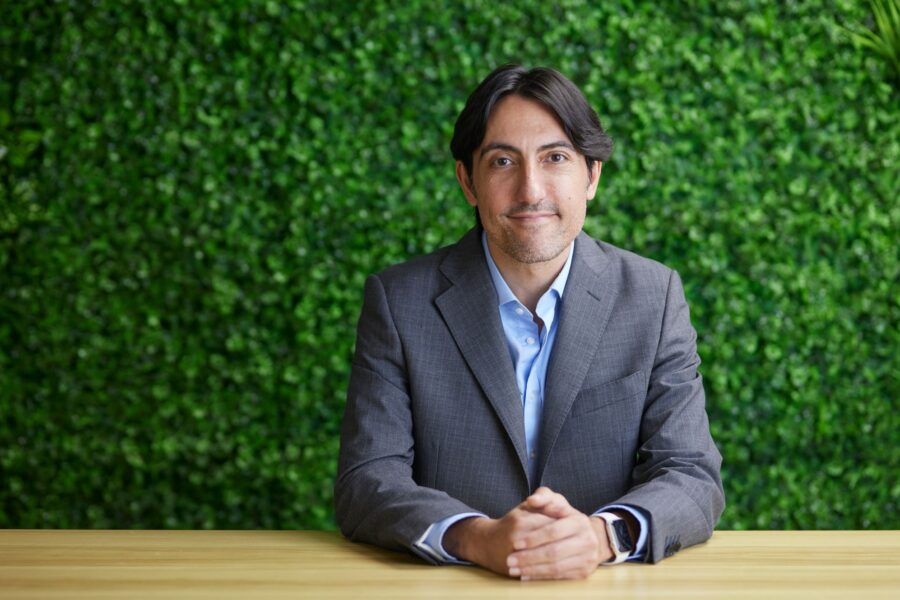
“We have created a portfolio of leading brands to make plant-based food options available and accessible to all consumers. One of our newly launched brands is Happiee!, a homegrown, plant-based range of ‘seafood’ and ‘chicken’ products. By providing these options, we want to inform consumers that choosing a healthier and more sustainable alternative is easy and can be done at their convenience. The entire Happiee! range is available at local supermarkets, such as FairPrice and Cold Storage, as well as online grocery retailers like RedMart,” shares Bossi.
He adds, “By offering these plant-based alternatives, we expect to offer nutritious alternatives that support the shift to more conscious and more sustainable eating. For example, we know that plant-based meat emits 34 to 93 percent less greenhouse gas than conventional meat and uses 76-89% less water than conventional meat. Opting for plant-based ‘fish’ also saves more than 50% of greenhouse gas as compared to farmed salmon.”
This year, Growthwell Foods is looking to expand its presence in Malaysia, Taiwan, China, and outside of Asia, into Europe. “We are in the midst of exploring opportunities to work with other companies in extending our products and services to other businesses and consumers in these markets. A key aspect for us when entering the European market is working with the right partners. We want to ensure our carbon footprint is reduced where possible, especially on the supply chain front. In addition, we are also looking to launch another consumer brand in the latter half of 2022 with a range of ready-to-eat meals that are inspired by flavours from Asian home cooking.”
On a personal level, Bossi reveals that he has adopted a flexitarian diet. “One of the reasons I embarked on this journey six years ago came from wanting to improve my overall health and reduce my impact on the environment. By reducing the consumption of animal protein, we are supporting our collective effect to bring down greenhouse gas emissions generated from animal husbandry. I was committed to finding options that had the best nutritional value, without compromising on taste.”
1-Arden
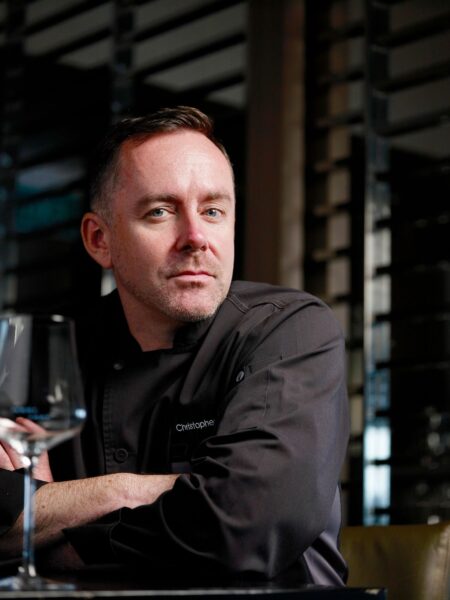
The 1-Group’s latest integrated F&B lifestyle destination, 1-Arden, is located within the new CapitaSpring tower in downtown Singapore. Comprised of five unique concepts – Bee’s Knees, Sol & Luna, Kaarla Restaurant and Bar, Oumi, and 1-Arden Bar – 1-Arden boasts the world’s highest Food Forest, whose themed gardens span 10,000 square feet. The new concept presents a showcase and platform of 1-Group’s values of sustainability and community outreach. Through like-minded partnerships, engagement, and education, the group aims to transform lives through distinctive concepts, transportive experiences, authentic discoveries, and a purposeful drive towards a thriving tomorrow.
According to Christopher Millar, culinary director of 1-Group, “Singapore has been building an image of a green city for years. We hope that together with our partners and government agencies, 1-Arden will be a showcase of ‘lifestyle thrivability’. The stunning rooftop vantage point along with the world’s highest Food Forest is where our in-house urban farmers and chefs work side-by-side to specially curate five themed gardens that tell the Singapore food story, as well as the importance of biodiversity and caring for our planet. The ability to bring the farm into our dining concepts with high level touch points and experiences differentiates 1-Arden as a unique concept.”

Millar reveals that with the ongoing global challenges – from the pandemic to geo-political problems – things seem quite bleak. 1-Arden, with its combination of beautiful garden spaces and spectacular views, provides an escape from the urban jungle and the pressure cooker stresses of city living. “With 1-Arden, it is an accessible place with a variety of bespoke dining and bar experiences to suit all lifestyle F&B needs. Sophisticated yet unpretentious, our goal is to fully integrate with the CapitaSpring community and become a fresh new icon on the Singaporean horizon,” he adds.
“Sustainability is a word that is thrown about quite loosely these days,” admits Millar. “We all know its importance, but how we make an impact as individuals can be quite overwhelming – the question is often, ‘where do I start?’ In our journey to better understand ESG (environmental, social, and governance) and CSR (corporate social responsibility), what I have learned is that you need to start somewhere and prioritize topics that we can have the most influence in. As chefs, we have the power to inspire and advocate in a very fundamental way, like how we can responsibly select our produce in a way that contributes to carbon footprints. I am personally very excited from an F&B lifestyle perspective. We have a fantastic platform with the new 1-Arden concept to activate and educate in a meaningful and impactful way.”
Green Rebel
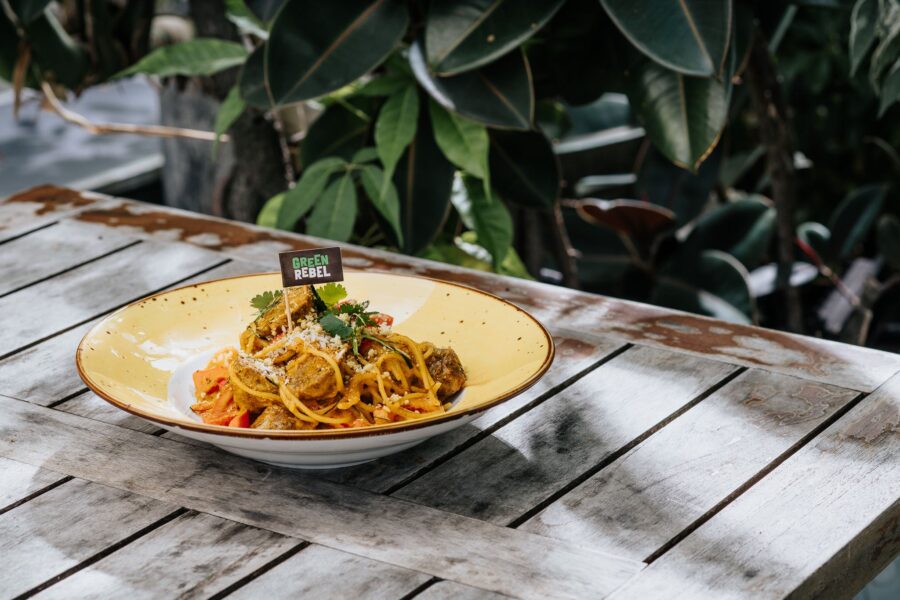
Indonesian plant-based meat startup Green Rebel recently launched in Singapore, serving up comforting and familiar dishes like satay, rendang, sweet & sour “pork”, and black pepper “beef” at locations around the island like Empress, Privé, Dragon Chamber, and Love Handle.
The company’s founders, Helga Angelina Tjahjadi and Max Mandias, tell us that they’re both passionate about the environment and have been living green as much as they can for years. “Going on a plant-based diet was the first step. At home, we compost, avoid using single-use plastics, and segregate our waste for recycling purposes. Fashion-wise, we try to consume a lot less,” reveals Tjahjadi. As for Mandias, animal welfare plays an important role on his green journey. “Aside from the environmental perspective of Green Rebel, I’m also doing it for animals. I want less suffering on animals, so I really put my heart into the creation of the brand.”
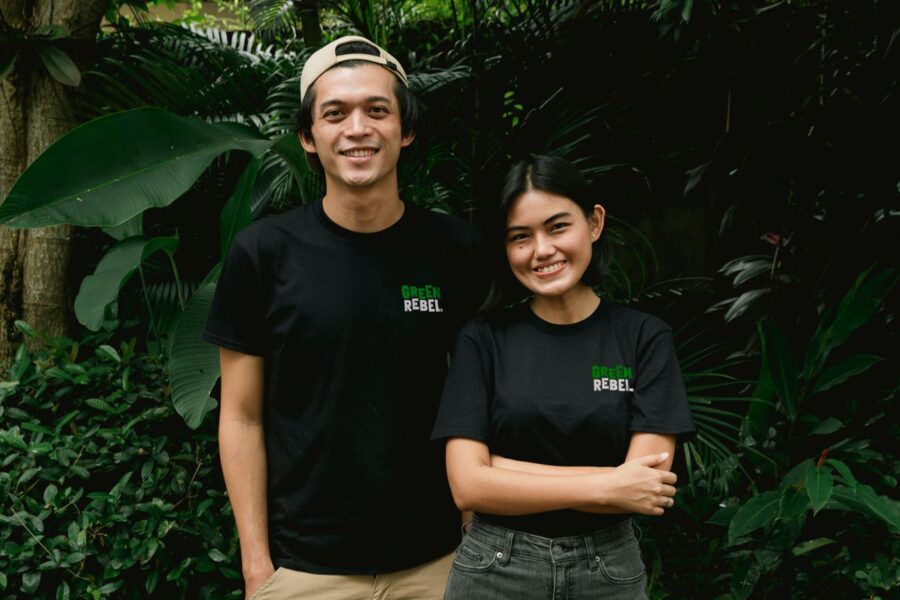
Green Rebel, which was officially launched in September 2020, uses natural plant-based ingredients like mushrooms and non-GMO soy, and then combined with cassava flour, rice flour, and whole oats, resulting in a nutrition-packed base protein.
To give it that distinct Asian twist, spices and herbs like lemongrass, galangal, turmeric, coriander, tamarind, and chilli are added to impart flavor and add umami, which is vital in our cuisine. “Local adaptation plays a crucial role,” admits Mandias. “To get people to be open to the idea of meat alternatives, market education is needed,” adds Tjahadi. “If they try it and like it, then they can consider adding it to their diets in the future, encouraging a move towards a flexitarian diet. We’re also very happy to work with local restaurant partners in Singapore, but later on, we would love to see Green Rebel products used in hawker centres.”
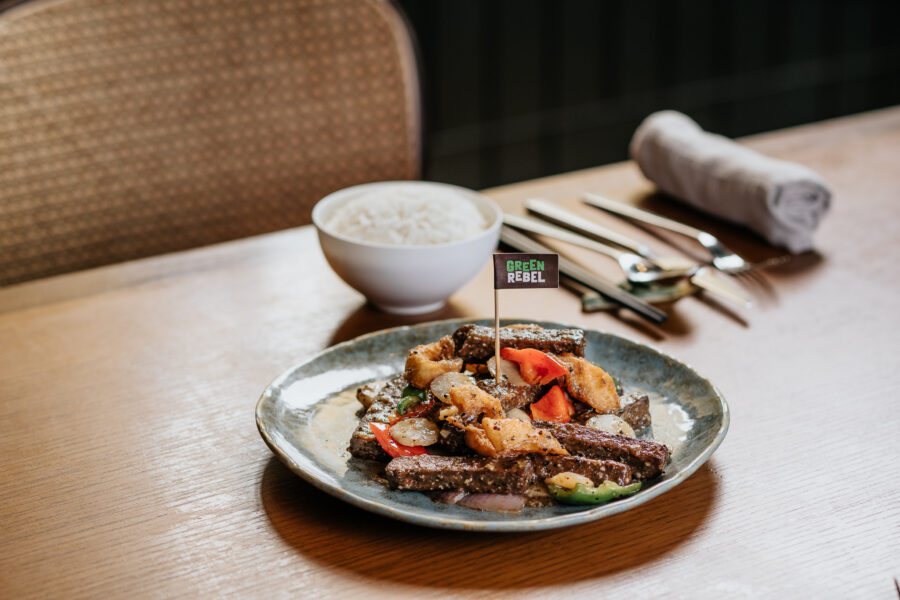
When asked if they think Green Rebel and green habits can change the world, Tjahadi and Mandias are hopeful. “There are calculators that measure all these. The ones we use track our eating habits, so we know the product we’re putting out is credible,” says Mandias. Tjahadi adds, “We engaged a food tech university in Indonesia and did a study to compare the environmental impact of Green Rebel “meat” to actual beef. The research found that our product has 90% less global warming potential because of lesser greenhouse gas emissions and land and water use. We definitely stick to research whenever we make any claims.”
A version of this article first appeared on Portfolio.
